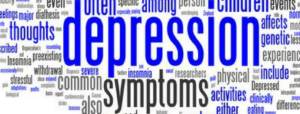In a nutshell, self-esteem is your opinion of yourself and your abilities. It can be high, low or somewhere in-between. While everyone occasionally has doubts about themselves, low self-esteem can leave you feeling insecure and unmotivated. You might be able to identify a few things that are affecting your opinion of yourself (maybe you’re being bullied, or you might be feeling lonely), or it could be a mystery. Either way, there are things you can do to improve your self-esteem.
1. Be nice to yourself
That little voice that tells you you’re killing it (or not) is way more powerful than you might think. Make an effort to be kind to yourself and, if you do slip up, try to challenge any negative thoughts. A good rule of thumb is to speak to yourself in the same way that you’d speak to your mates. This can be really hard at first, but practice makes perfect. If you want a few pointers, check out our tips for talking yourself up.
2. You do you
Comparing yourself to other people is a sure-fire way to start feeling crummy. Try to focus on your own goals and achievements, rather than measuring them against someone else’s. Nobody needs that kind of pressure!
3. Get moving
Exercise is a great way to increase motivation, practice setting goals and build confidence. Breaking a sweat also cues the body to release endorphins, the feel-good hormones.
4. Nobody’s perfect
Always strive to be the best version of yourself, but it’s also important to accept that perfection is an unrealistic goal.
5. Remember that everyone makes mistakes
You’ve got to make mistakes in order to learn and grow, so try not to beat yourself up if you forget to hit CTRL+S on a super-important assignment. Everyone’s been there.
6. Focus on what you can change
It’s easy to get hung up on all the things that are out of your control, but it won’t achieve much. Instead, try to focus your energy on identifying the things that are within your control and seeing what you can do about them.
7. Do what makes you happy
If you spend time doing the things you enjoy, you’re more likely to think positively. Try to schedule in a little you-time every day. Whether that’s time spent reading, cooking or just conking out on the couch for a bit, if it makes you happy, make time for it.
8. Celebrate the small stuff
You got up on time this morning. Tick. You poached your eggs to perfection. Winning. Celebrating the small victories is a great way to build confidence and start feeling better about yourself.
9. Be a friend
Being helpful and considerate to other people will certainly boost their mood, but it’ll also make you feel pretty good about yourself.
10. Surround yourself with a supportive people
Find people who make you feel good about yourself and avoid those who tend to trigger your negative thinking.
When you’re having a panic attack, it might feel like you’re drowning. You feel like you can’t breathe and your chest is constricted. You might feel detached from your body, from your surroundings, as though you’re floating in a dream. You might become overheated with clammy hands, a flushed face and sweat trickling down your spine. You also might be shaking.
Experiencing a panic attack at home or in public is bad enough. Experiencing one at work can be extra stressful. You might feel incredibly alone. You might feel a profound sense of shame. You might berate yourself for being the only person who clearly can’t control himself or herself.
And that’s a powerful part of the stress: In addition to a job’s demands, we have the added pressure of having to hold it together, Clark said. It’s not just that we’re asked to do more things or make uncomfortable phone calls or respond to a nasty email. It’s also that we’re supposed to be professional, which means we’re not supposed to show our feelings. Or at the very least, we’re not supposed to feel anxious.
The good news is that you can learn to manage panic attacks. Here are tips to help.
Find privacy
“It’s awfully difficult once you start to feel panic to pull yourself out of it when you’re in public. You might be around people you don’t feel comfortable with. You might feel judged. People who struggle with recurrent panic tend to struggle with other anxieties, such as asocial anxiety. At its core, social anxiety is a fear of other’s judgment. This is why it’s helpful to excuse yourself to whatever place you can that allows you some space, such as a bathroom.
Don’t ignore it
Some sufferers try to stop a panic attack by ignoring it and trying to perform their responsibilities. But “ignoring your symptoms will only make them worse” and compromise your work performance. It’s more helpful to acknowledge what’s happening.
Don’t fight it
It’s hard not to fight the symptoms of a panic attack. Because they’re so uncomfortable, your natural reaction might be to make it stop. Just make it stop. But this only fuels your symptoms. Instead, to embrace the physical sensations. “Let it wash over you, and know you can handle it even if it’s horribly uncomfortable.” Your panic attack will pass. It’s important to note that many people, particularly when they experience their first panic attack, have no idea what’s going on—and start thinking the worst. They assume they’re dying. But you are safe. Nobody has ever died from a panic attack.
Observe your sensations
Similarly, observe your symptoms without trying to control or change them. For instance, notice that your palms are flushed and filled with blood. Notice that you’re alive and breathing. Notice as your body is calming down, which is different from telling your body to calm down. In other words, step back and try to notice what’s happening.
Refocus on your environment
What also drives anxiety is thinking about the future or thinking too many things at once. Essentially one anxious thought leads to another anxious thought and so on. This is why staying in the present, or grounding yourself in the moment, is important.
One way to do this is to focus on your surroundings. What’s in the room with you? What color and shape is the desk? What are the knobs made of? What color is the tile? What is immediately in front of you?
Take productive action
Anxiety—and panic at the ultimate extremes—is…a signal that something you care about is at risk. And the most powerful antidote to anxiety is taking control and taking action.
Try to pinpoint what triggered your anxiety. For instance, maybe you have no idea how you’ll make a project deadline. Instead of being angry about the deadline and wishing it away, think about what you can control. You can control how you spend your time and how you create the project. You can control asking your boss for an extension. Instead of expending energy on resisting and avoiding anxiety, channel that energy into what you can control.
Reach out
It might be helpful to call a loved one who’s supportive. You might ask a colleague to cover your desk or tell your boss you’re taking a brief break.
Panic attacks are “horribly uncomfortable, but they don’t have to be debilitating. Just like you’ve learned to have them, you can unlearn. It takes practice (like anything). And you might find it more helpful to work with a therapist who specializes in treating panic. Remember you are not alone—not at all—and you can get through this.
Mindfulness is applied to several disciplines and practices such as tai chi, yoga, qigong and so on. But most of these practices focus on mindfulness through meditation. A process that involves a self- regulatory practice done with the aim of bringing the mind under total control and the entire mental process under subjection. Several theories and findings expose the hidden benefits of this act. Researches believe that mindfulness promotes and regulates psychological health, cognitive awareness, calmness, concentration and clarity of the mind.
To be more specific, here are some revealed benefits of mindfulness to the human body.
☯ It reduces rumination: Mindfulness has been known to reduce the rumination of the human mind according to research. The mind tends to be more focused, and attention fixed when the body experiences mindfulness.
☯ Stress reduction: It reduces stress by eliminating anxiety and overwhelmed. When you carry out a mindful meditation, you will be able to put your emotions under control, and this is what eliminated anxiety, depression and other stress factors.
☯ Focus: With careful thinking and meditation, your attention tends to be fixative on a particular subject or feeling. Your mind will be able to suppress all forms of distracting thought and attitude. Due to the high level of focus your entire body engages in during this period, your emotional reactivity will decrease. An outburst of anger, shedding of tears and a wow look on the eyes, are all resultant effect of lack of mindfulness. This can be eliminated during the process of the mindful activity.
☯ Mindfulness aid recovery from illness: It can help you deal with chronic diseases as well as recover from it. According to a recent study, mindfulness has been found to have the ability to aid traumatic growth in cancer survivors.
☯ Can be used to treat depression: Medical practitioners have long used it as an effective means of treating depressed patients. It is responsible for releasing the necessary hormone and cognitive thinking needed for stepping back on bad emotions. According to a study by Barnhofer and Costa. They discovered that unlike a mere imaginary relaxation, mindfulness helped people suffering from depression to gain a more significant emotional regulation and reduce their symptoms subsequently.
☯ Improved general health: aside from it specific benefits, mindfulness also enhances overall health and well being of an individual. A study on mindfulness has revealed that it can develop the cardiovascular activities of the body. It promotes a lifestyle free from smoking, a healthier body mass, and more physical activity. It has also been linked to lower blood pressure due to the concentrating and relaxing effect it has on the mind.
☯ It leads to increased academic success: children too can enjoy the fantastic benefits of mindfulness and not just adults alone. Although this benefit is not reserved for any specific group of practitioners, it has been used to achieve better academic excellence in children and college students.
☯ Boosts resilience and provides support: Mindfulness is very helpful to students and adults who have been in mentally traumatized and suffering from severe mental paralysis. Especially those trying to recover from an illness, or trying to cope with a particular struggle or feeling.
People can learn to manage stress and lead happier, healthier lives.Here are some tips to help you keep stress at bay.
- Keep a positive attitude.
- Accept that there are events that you cannot control.
- Be assertive instead of aggressive. Assert your feelings, opinions, or beliefs instead of becoming angry, defensive, or
passive. - Learn and practice relaxation techniques; try meditation, yoga, or tai-chi
- Exercise regularly. Your body can fight stress better when it is fit.
- Eat healthy, well-balanced meals.
- Learn to manage your time more effectively.
- Set limits appropriately and learn to say no to requests that would create excessive stress in your life.
- Make time for hobbies, interests, and relaxation.
- Get enough rest and sleep. Your body needs time to recover from stressful events.
- Don't rely on alcohol, drugs, or compulsive behaviours to reduce stress.
- Seek out social support. Spend enough time with those you enjoy.
- Seek treatment with a psychologist or other trained in stress management techniques to learn healthy ways of dealing with the stress in your life.
Generalized anxiety disorder (GAD) is more than the normal anxiety people experience day to day. It’s chronic and exaggerated worry and tension, even though nothing seems to provoke it. Having this disorder means always anticipating disaster, often worrying excessively about health, money, family, or work. Sometimes, though, the source of the worry is hard to pinpoint.
Simply the thought of getting through the day provokes anxiety.
People with GAD can’t seem to shake their concerns, even though they usually realize that their anxiety is more intense than the situation warrants — that it’s irrational. People with GAD also seem unable to relax. They often have trouble falling or staying asleep. Their worries are accompanied by physical symptoms, especially trembling, twitching, muscle tension, headaches, irritability, sweating, or hot flashes. They may feel lightheaded or out of breath. They may feel nauseated or have to go to the bathroom frequently. Or they might feel as though they have a lump in the throat.
Many individuals with GAD startle more easily than other people. They tend to feel tired, have trouble concentrating, and sometimes suffer depression too.
Usually, the impairment associated with GAD is mild and people with the disorder don’t feel too restricted in social settings or on the job. Unlike many other anxiety disorders, people with GAD don’t characteristically avoid certain situations as a result of their disorder. However, if severe, GAD can be very debilitating, making it difficult to carry out even the most ordinary daily activities.
GAD comes on gradually and most often hits people in childhood or adolescence, but can begin in adulthood, too. It’s more common in women than in men and often occurs in relatives of affected persons. It’s diagnosed when someone spends at least 6 months worried excessively about a number of everyday problems.
Specific Symptoms of Generalized Anxiety Disorder
Excessive anxiety and worry (apprehensive expectation), occurring more days than not for at least 6 months, about a number of events or activities (such as work or school performance).
The person finds it difficult to control the worry.
The anxiety and worry are associated with three (or more) of the following six symptoms (with at least some symptoms present for more days than not for the past 6 months; children do not need to meet as many criteria–only 1 is needed).
- Restlessness or feeling keyed up or on edge
- Being easily fatigued
- Difficulty concentrating or mind going blank
- Irritability
- Muscle tension
- Sleep disturbance (difficulty falling or staying asleep, or restless unsatisfying sleep)
Additionally, the anxiety or worry is not specifically about having a panic attack (though panic attacks can occur within a person with GAD), being embarrassed in public (as in social phobia), being contaminated (as in obsessive-compulsive disorder), being away from home or close relatives (as in separation anxiety disorder), gaining weight (as in anorexia nervosa), having multiple physical complaints (as in somatization disorder), or having a serious illness (as in hypochondriasis), and the anxiety and worry do not occur exclusively during posttraumatic stress disorder (PTSD).
The anxiety, worry, or physical symptoms cause clinically significant distress or impairment in social, occupational, or other important areas of functioning.
The disturbance is not due to the direct physiological effects of a substance (e.g., a drug of abuse, a medication) or a general medical condition (e.g., hyperthyroidism) and does not occur exclusively during a mood disorder, a psychotic disorder, or a pervasive developmental disorder.

Depression is a common and serious medical illness that negatively affects how you feel, the way you think and how you act. Fortunately, it is also treatable. Depression causes feelings of sadness and/or a loss of interest in activities once enjoyed. It can lead to a variety of emotional and physical problems and can decrease a person’s ability to function at work and at home. Depression is among the most treatable of mental disorders. Between..

Depression is a common and serious medical illness that negatively affects how you feel, the way you think and how you act. Fortunately, it is also treatable. Depression causes feelings of sadness and/or a loss of interest in activities once enjoyed. It can
lead to a variety of emotional and physical problems and can decrease a person’s ability to function at work and at home.
Depression is among the most treatable of mental disorders. Between 80% and 90% of people with depression eventually respond well to treatment. Almost all patients gain some relief from their symptoms.

Depression Symptoms
- Feeling sad or having a depressed mood
- Loss of interest or pleasure in activities once enjoyed
- Changes in appetite — weight loss or gain unrelated to dieting
- Trouble sleeping or sleeping too much
- Loss of energy or increased fatigue
- Feeling worthless or guilty
- Difficulty thinking, concentrating or making decisions
- Thoughts of death or suicide
Symptoms must last at least two weeks for a diagnosis of depression.

Depression Treatment
Before a diagnosis or treatment, a health professional should conduct a thorough diagnostic evaluation, including an interview and possibly a physical examination. In some cases, a blood test might be done to make sure the depression is not due to a medical condition like a thyroid problem. The evaluation is to identify specific symptoms, medical and family history, cultural factors and environmental factors to arrive at a diagnosis and plan a course of action.
Medication:
Brain chemistry may contribute to an individual’s depression. For this reason, antidepressants might be prescribed to help modify one’s brain chemistry. These medications are not sedatives, “uppers” or tranquillizers. They are not habit-forming. Generally, antidepressant medications have no stimulating effect on people not experiencing depression. Antidepressants may produce some improvement within the first week or two of use. Full benefits may not be seen for two to three months. It is important to let your doctor know if a medication does not work or if you experience side effects.

Psychotherapy
Addressing the underlying emotional issues which cause the depressive state is an important component of a full and long-term recovery.

-
Cognitive behavioural therapy (CBT) has been found to be effective in treating depression. CBT is a form of therapy focused on the present and problem-solving. CBT helps a person to recognize distorted thinking and then change behaviours and thinking.

-
Progressive relaxation and hypnotherapy are also often implemented to help the patient manage their stress and anxiety symptoms and the sense of overwhelming.

-
EMDR When depression is a result of abuse or other traumatic experiences.EMDR has proven to be a very effective treatment.

